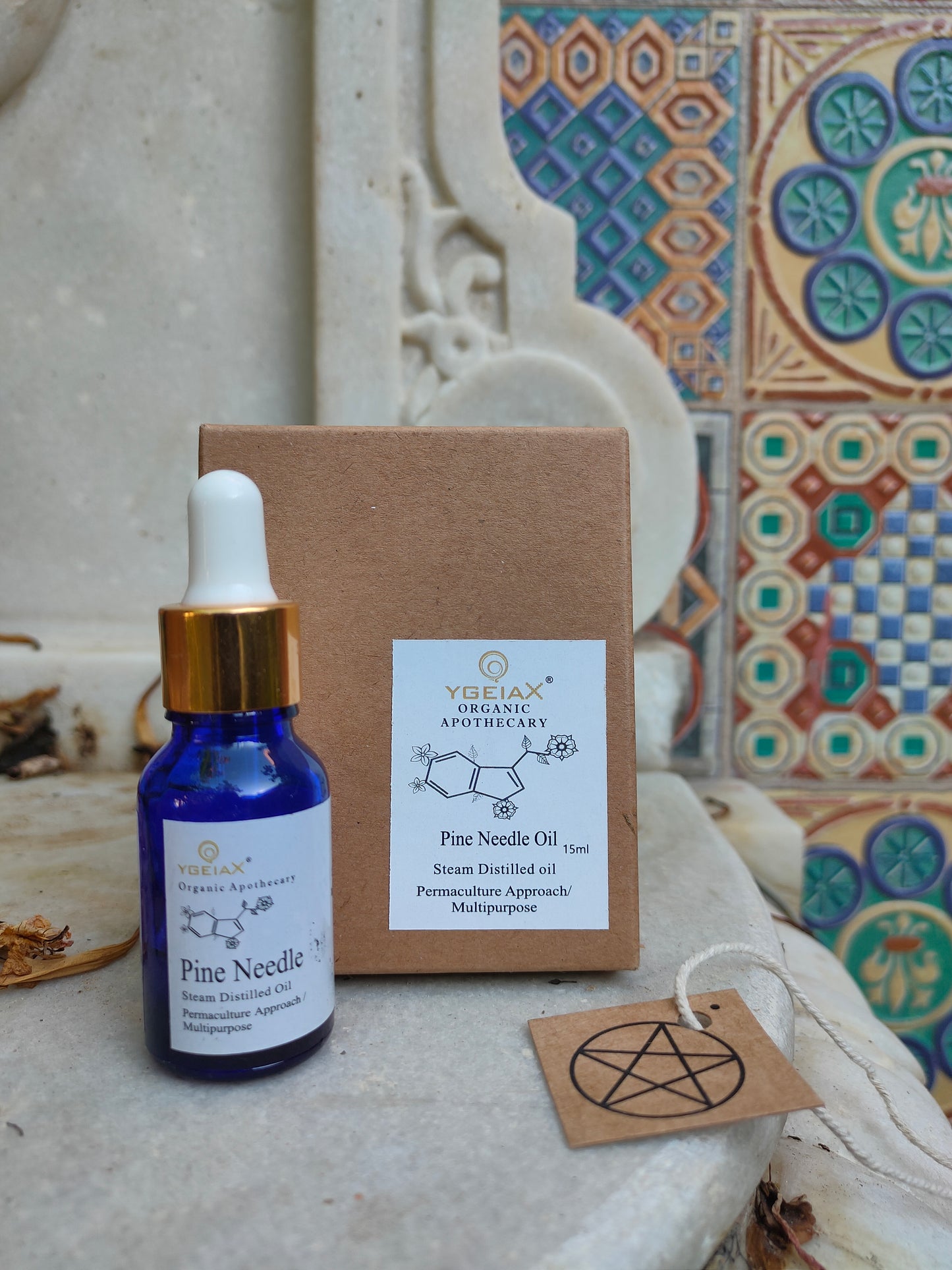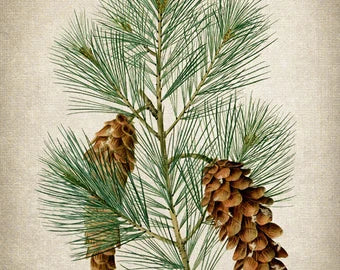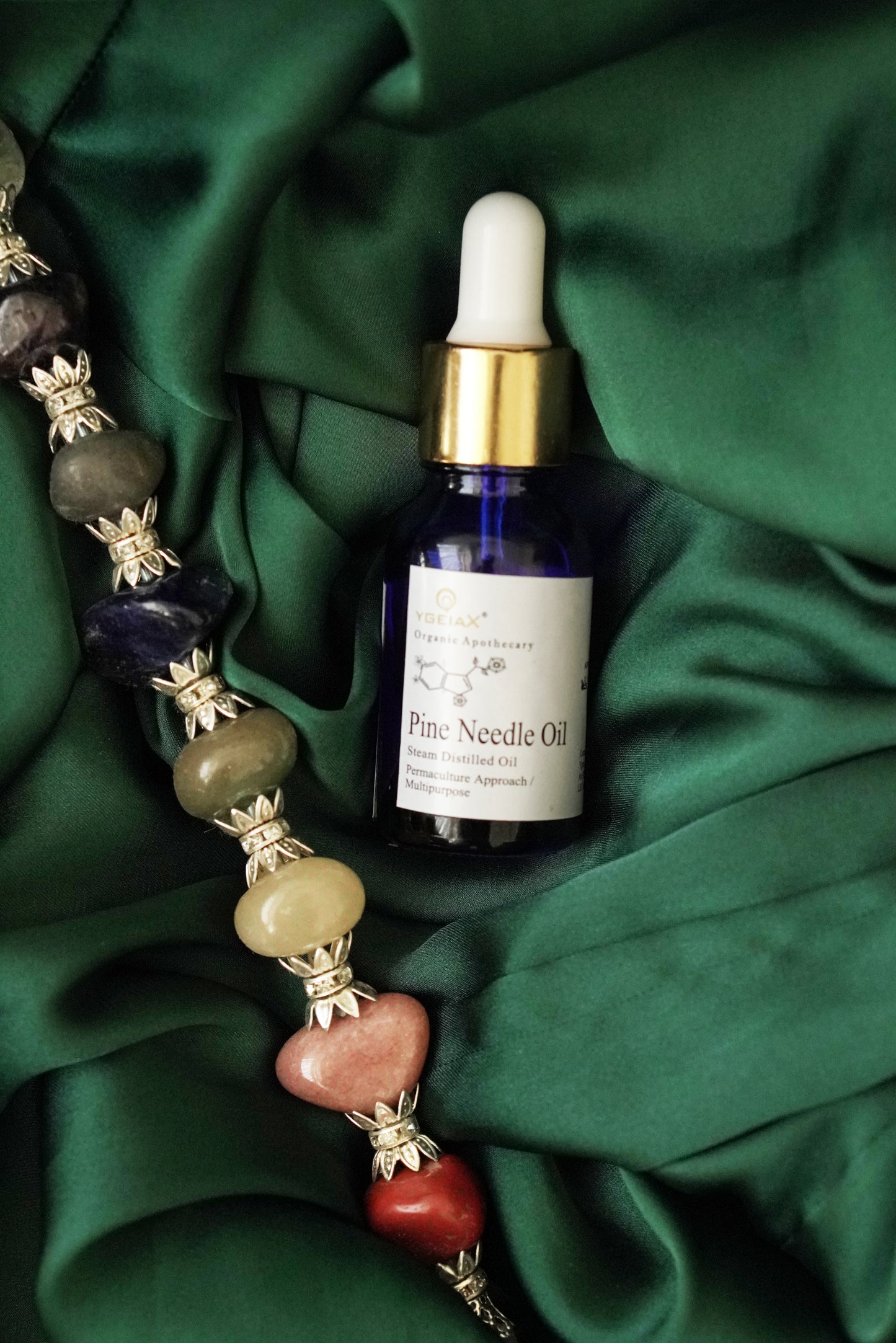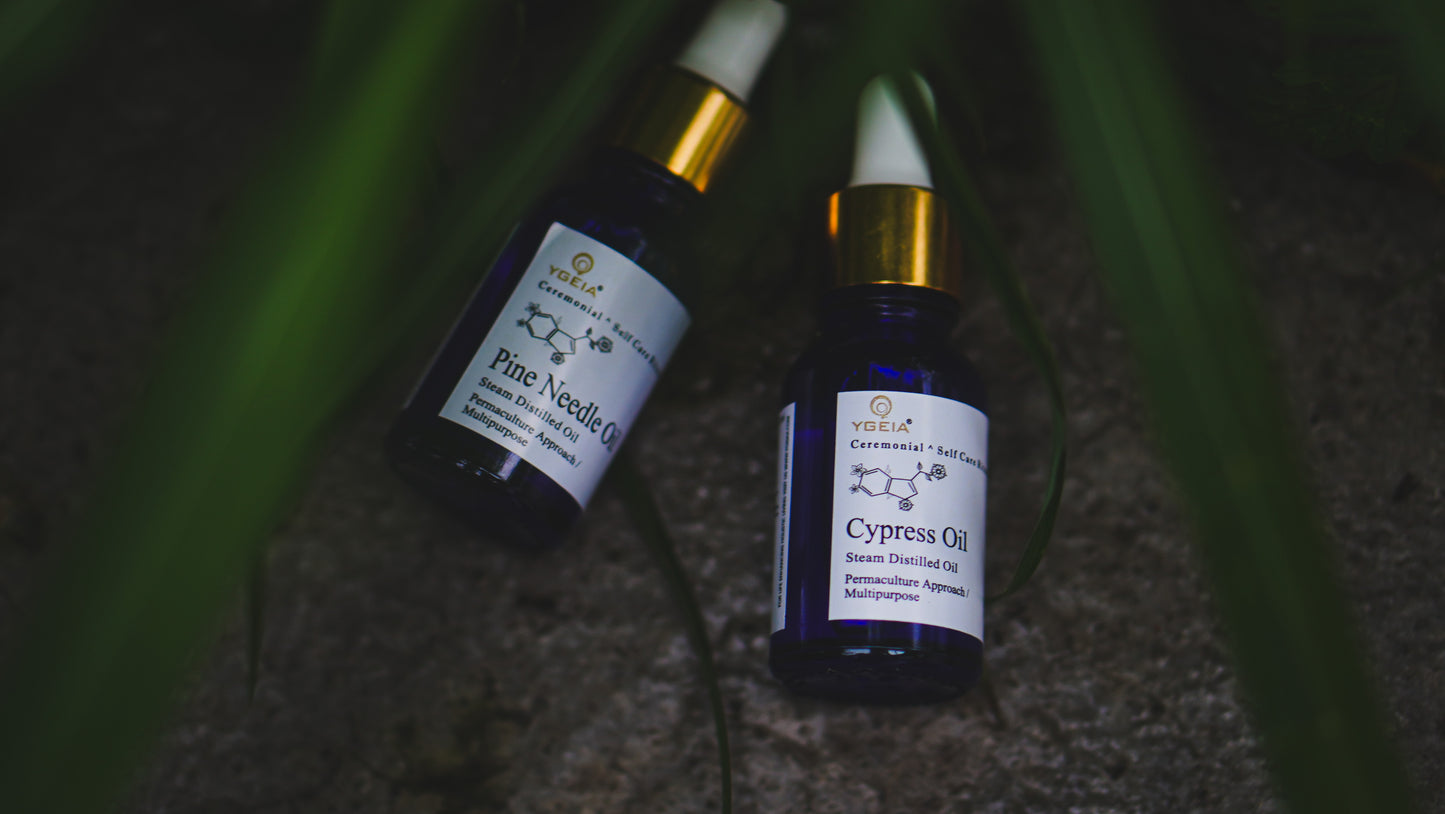Pine Needle Steam Distilled Oil
Pine Needle Steam Distilled Oil
Couldn't load pickup availability
Pine oil, is derived from the needles of the Pinus sylvestris tree. Known for being cleansing, refreshing and invigorating, pine oil has a strong, dry, woodsy smell — some even say it resembles the scent of forests.
With a long and interesting history that stems back to use in ancient Greek civilizations, including by Hippocrates himself, pine oil is an age-old therapeutic method for cleansing, reducing pain, increasing energy and relieving stress.
Recently, it’s also been studied for its strong anti-inflammatory and antioxidant constituents that can help battle cancer development and protect vital organs, including the brain, heart, liver and gut.
Pine Oil Benefits
- Cleansing the home of bacteria, fungi, pathogens and yeast
- Killing odours and purifying the air
- Decreasing inflammation
- Decreasing Allergies
- Fighting free radicals through the presence of antioxidants, including polyphenols
- Treating Muscle Aches and pain
- Energizing and lifting your mood and focus
1. Air Freshener
Pine oil is an excellent natural deodorant since it eliminates bacteria and microbials that can lead to contamination and odours. Capable of killing toxins in the air that can cause colds, the flu, headaches or skin reactions, pine oil is one of the most beneficial essential oils for improving immune function.
For pure, clean-smelling air throughout your home or even car, diffuse pine oil for 15–30 minutes using an oil differ or combine it with some water in a spray bottle and spray around your furniture, countertops, linens or car seats.
Also, try adding pine oil to a cotton ball and placing it behind your toil seats in your bathrooms to freshen the air naturally. And around Christmas, you can create a homemade “Christmas candle” by combing several drops of pine nut oil, sandalwood or cedarwood oil on a fire log about 30 minutes before burning in your fireplace.
2. All-Purpose Household Cleaner
To cleanse your countertops, appliances, bathroom or floors, combine several drops of pine oil and water in a spray bottle and spray on any surface before wiping down with a clean cloth.
3. Pots and Pans Scrub
For a deeper-acting cleaning scrub, combine several drops of pine oil with baking soda and stir them into a thick paste. Use a brillow sponge to scrub away mold, stains or stuck-on residue from your pots, home surfaces, car or appliances.
4. Floor Cleaner
To mop your floors and leave behind a clean smell, add ½ cup of white vinegar along with 10 drops of pine oil to a bucket and mop into wood surfaces before rinsing.
5. Glass and Mirror Cleaner
You can clean mirrors, glass or kitchen appliances by using pine nut oil along with vinegar to remove residue and leave behind shiny, clean surfaces. Also try using this method to clean your blender, dishwasher or laundry machine.
6. Carpet Cleaner
Use pine essential oil to remove odors from your carpet, mix 15–20 drops of pine essential oil with water in a bucket and then scrub into stains on your rugs. You can either use a carpet-cleaning device to steam or roll the mixture further into carpets or do so by hand. You don’t need to remove the oil from the carpets since it’s non-toxic and will continue to kill odor-causing bacteria and add a fresh scent to your home in the process.
7. Garbage Can Purifier
Douse a cotton ball with two drops each of lemon oil and pine oil, and then place the cotton balls at the bottom of your trashcans to help decrease bacteria and odors.
8. Shoe Smell Reducer
To get rid of shoe or foot odors, add a few drops of pine oil and tea tree oil to the bottom of shoes to freshen them up and kill bacteria.
9. Anti-Inflammatory
Pine oil has been used to fight free radical damage and chronic inflammatory responses that can lead to pain or swelling and even contribute to chronic diseases, including arthritis and cancer. To take pine oil as a supplement, you can add one to two drops to tea or hot water with lemon
10. Detoxifier
To help stimulate the digestive organs, such as acting like a natural liver cleanse consume one to two drops of pine oil along with other cleansing ingredients, including lemon and raw honey. This helps detoxify the body and flush out toxins and waste.
11. Headache Reliever
Because it can help decrease toxins in the air or around your home that can trigger sickness or headaches, pine oil is one of the great headache remedies. It’s also useful for reducing stress and lifting your mood, which are other causes of migraines or PMS-related headache symptoms.
Rub several drops of pine along with coconut oil into your temples and chest, or spray it onto your clothes as a natural fabric freshener and perfume. You can also directly inhale it when a headache hits or diffuse it into the air for 20 minutes.
12. Skin Care
Essential oils can make great natural acne treatment that work fast. And because it can fight bacteria and fungus, pine oil may be useful with a variety of skin conditions, including psoriasis, warts, boils, athlete’s foot, eczema and itching. It’s also helpful for removing dandruff from the scalp and adding shine to hair. However, use caution because certain people can experience skin sensitivity to pine.
13. Natural Energizer
Pine essential oil is often used for relieving mental and physical fatigue since it can help improve thinking, alertness and memory. It makes a great natural perfume or body lotion ingredient for improving focus during studying, exercise, driving and any other situation where you need to remain alert. It also has the ability to increase your clarity of mind.
14. Stress Reducer
For a natural anxiety remedy or to help get you out of a slump, try diffusing pine along with lemon oil, bergamot or frankincense while praying, meditating or reading. This can help increase spiritual alertness and awareness. Pine oil can also be included as part of prayer time.
15. Allergy Fighter
Because pine can effectively fight fungi lurking in the air, it’s been shown to lower the presence of toxins that can cause difficulty in breathing, allergic rhinitis, watery eyes or flu-like symptoms. Diffuse pine oil throughout your home or inhale it directly from the bottle. If you’re already feeling sick, try combining pine oil and eucalyptus with coconut oil and rubbing it into your chest, neck and upper back to open your nasal passages.
Research
Pine trees are a sustainable crop and widely grown in cold climate areas throughout the world. In fact, unlike many other essential oil plants, pine trees are durable and resistant to weather changes since they can withstand temperatures as low as minus 40 degrees!
Historically, mattresses were said to be stuffed with the needles of the pine tree to help repel lice and fleas. The ancient Egyptians also supposedly used pine kernels in their cooking to kill food bacteria and decrease contamination.
Known for being a fresh-smelling ingredient in many household cleaners, pine essential oil can do more than freshen up your home — it also has the ability to remove potentially dangerous fungi, bacteria, molds and yeast.
Over recent years, as considerable interest has been given to natural plant extracts that have great use for the improvement of air quality without the need for harsh chemicals, pine nut extract has been one essential oil to rise to the top. Pine oil has been well-researched for its abilities to purify poor indoor air quality, which largely depends on the chemical composition of microorganisms living in the air that lead to pollution, odors, germ-spreading and contamination.
Some species of fungi and bacteria living in the air (Aspergillus flavus, A. fumigatus, A. niger and others) and their toxins cause difficulty in breathing, allergic rhinitis, watery eyes, headaches and flu-like symptoms. In 2004, when researchers from Vilnius Pedagogical University in Lithuania investigated the purifying biological activity of Pinus sylvestris L. extract in order to find out its fungicidal benefits against airborne microorganisms, they found positive results. Antimicrobial activity of pine oil was evaluated by technique of oil diffusion to Czapek agar (for fungi), malt extract agar (for yeast and yeast-like fungi) and nutrient agar (for bacteria).
In total, pine oil was tested on 13 species of toxins living within the air (eight fungi, two yeast-like fungi, yeast and two bacteria). Results showed minor to strong activity against all types of fungi, spore bacteria, yeast-like fungi, yeast and bacteria, with pine having the biggest effects on reducing bacteria and lesser effects on more resistant fungi strains. The most active concentration of pine oil against all tested microorganisms was 2.5 percent.
Recently, pine essential oil also has taken notice for its anti-inflammatory, antioxidant capabilities. Specifically, pine has been discovered to be rich in polyphenol antioxidants that can help halt cancerous tumor growth and metastasis. And certain studies have also discovered several anti-inflammatory lignans within bioactive extract of pine bark that might be beneficial for heart health and cognitive functioning in addition to acting like natural cancer treatment
A 2004 study published in the Journal of Agricultural and Food Chemistry found strong anti-inflammatory properties of phenolic pine bark extract using high-performance liquid chromatography to reveal the most potent constituents. The phenolic compositions of three pine bark samples were analyzed, and results found eight primary compounds. Among the active chemicals that were isolated and identified for their free radical scavenging capabilities, 28 different phenolic compounds were identified.
The effects of the three pine bark samples on the synthesis of two pro-inflammatory mediators, called nitric oxide and prostaglandin, were also measured. It was shown that pine bark contains multiple compounds that fight oxidative stress and inhibit the production of pro-inflammatory mediators that can contribute to diseases like diabetes, arthritis, cancer and cognitive disorders.
A 2014 study investigating the chemical composition and antitumor effects against HeLa cells of pine extract derived from Pinus sylvestris L. bark showed positive anti-cancer activities. Analysis of pine oil helped researchers identify several other key constituents, including taxifolin, taxifolin-hexoside and several procyanidins. Pine bark extract exhibited a high cytotoxicity against HeLa cells (a type of cell involved in human cervical cancer) and revealed the ability of to induce apoptosis, or self-destruction of harmful cells.
15ml
Share








